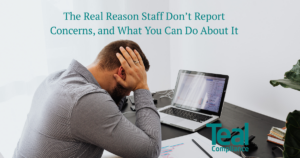There are firms that, for one reason or another, are finding themselves in unexpected commercial difficulties that make their longer term viability questionable. Radical reconstruction by consolidation through merger may be the only alternative to closing doors for good, with all the unsavoury knock-on consequences that this entails.
So now – more than ever – there are likely to be opportunities for merger to the potential benefit of both parties and compliance due diligence is extremely important.
Compliance due diligence
In any potential merger situation, it is becoming increasingly clear that compliance needs to be at the top of the priority list. Overall, it is a great indicator as to the overall management style of the merger target as, on a broader scale, the major regulatory standards are placing an increasing significance on the wider principles of good governance as an underpinning ethos to the compliance that they foster.
So… if you’re an ‘acquiree’, what do you need to do to prepare the firm for marketing, and as an ‘acquirer’ what do you need to look for?
They are actually two sides of the same coin. If you are the firm looking for help through merger, it’s similar to a job interview – prepare, prepare, prepare, and then prepare. This applies to training all levels of staff in what we are doing and why. Make sure that everyone is on board as their future employment may depend on it.
As an acquirer, the due diligence cannot be too thorough, especially in the current climate when many personnel are likely to be dispersed.
The SAR Principles
The overarching standard is of course the SAR Principles, revised and reduced from ten to seven in November 2019. They are as follows and should be thoroughly interrogated:
“You act:
- in a way that upholds the constitutional principle of the rule of law, and the proper administration of justice.
- in a way that upholds public trust and confidence in the solicitors’ profession and in legal services provided by authorised persons.
- with independence.
- with honesty.
- with integrity.
- in a way that encourages equality, diversity and inclusion.
- in the best interests of each client.”
In support of these Principles the firm needs to have a COLP and COFA and you should check that the roles are filled by someone who is appropriately qualified and trained – and takes the role seriously.
You are seeking to adduce evidence that the firm not only talks a good talk but actually delivers on those verbal assurances. There will usually be two aspects to the proof needed that there is such delivery.
You will need to check that there are Standard Operating Procedures that are encapsulated in systematised written format. These will, or should, form recognisable parts of the firm’s Operations Manual.
It maybe that there are a number of different manuals though e.g. the Data Protection or Lexcel Manuals. If the Manuals are stored electronically the fact that they’re all in the same ‘Compliance’ area is indicative of how orderly the firm’s management processes are. Hopefully the Manuals will all be assembled ready for inspection – a well organised firm should have sufficient confidence in its systems to know what a merging firm will be looking for.
You will need empirical evidence. This will take the form of findings from interviews, both formal and informal, and from written records relating to inductions, training and Personal Development Reviews or Appraisals. There will be clues as to the effectiveness of the firms’ governance with such items as structural organograms and procedures for escalating responses for incident handling.
Minutes from meetings of all types, and policy review schedules can also be very helpful aside from broader good governance you should check for clear documentation of the firm’s supervisory structures.
There is increasing emphasis being placed on this in the SRA principles as well as the GDPR / DPA legislation.
How do you find it?
The paper (or electronic equivalent) trail is self-explanatory – time consuming but worthwhile. Gathering empirical evidence is more challenging but probably more revealing.
The firm’s COLP and COFA will always be interviewed. Further interviews should be carried out with a good cross-section of all staff and include front and back office staff at all levels. Remember that conversations solely with partners/senior management will give a slanted perspective.
Insurances – Appropriate levels of PII insurance will be checked together with the firm’s Complaints and Claims registers in support of this. How these are administered is a good indicator of the general management style of the firm and attitude towards compliance. Appropriate cover in other areas to complement the firm’s Business Continuity Planning will also be checked.
Supervision – From the point of view of supervision checks you should speak to both supervisors and supervisees on whether issues are dealt with on a one-to-one basis or in teams; whether training needs are formally identified and how the training is delivered and monitored. This is especially important in the new era of remote working in which firms are currently operating. This topic has been explored in other recent blogs on the Teal Compliance website.
File Reviews – These are another rich source of data and are a vital part of delivering the quality required by the SAR. Check how often they are carried out and by whom and what happens to the results of the reviews.
Training Schedules and Attendance Records – These are very revealing about the firm’s overall attitude towards compliance and its effective implementation especially when read in conjunction with staff interviews for cross-referencing. The firm’s approach towards conflicts avoidance should be carefully monitored.
The firm’s management of its central Key Dates diary should be similarly examined.
How do you evaluate it?
It is advisable not to rely on just one opinion and to apply some sort of consistent level of scoring on how compliance is being managed.
Results from interviews are likely to be more subjective so a structured series of open questions contained in a questionnaire will help towards achieving consistency.
What is it telling you?
Working on a “RAG” (Red, Amber, Green) method of assessing levels of compliance it would be highly unusual and deeply suspect to come up with a full pack of Greens. It is a useful indicator but not the whole story. What you are really looking for is the overall style of approach to the whole portfolio of regulatory compliance.
Every firm will have setbacks or issues occurring that expose actual or potential weaknesses in a firm’s breach prevention armoury. These are of themselves not necessarily the most important thing. What really matters is, how the firm approaches dealing with the actual or potential issues, and the overall compliance-embracing culture of the firm, and how the firm works to embed and keep embedded this culture at all levels.
If you are in any doubt about carrying out this sort of exercise then you shouldn’t hesitate to ask for outside help. A third pair of eyes can in any event add an element of objectivity that may be difficult to maintain internally when people are either enthusiastically – or unenthusiastically – polarised about a merger project.
Get in touch
If you’d like to know more about how Teal’s compliance services can help, simply contact our experts today.




